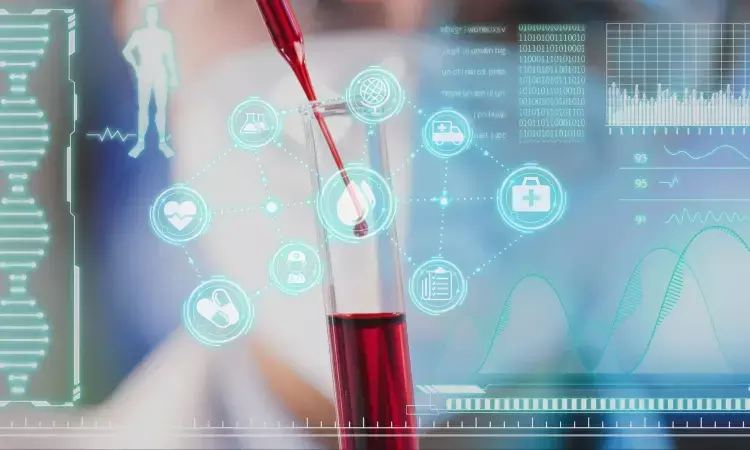- Home
- Medical news & Guidelines
- Anesthesiology
- Cardiology and CTVS
- Critical Care
- Dentistry
- Dermatology
- Diabetes and Endocrinology
- ENT
- Gastroenterology
- Medicine
- Nephrology
- Neurology
- Obstretics-Gynaecology
- Oncology
- Ophthalmology
- Orthopaedics
- Pediatrics-Neonatology
- Psychiatry
- Pulmonology
- Radiology
- Surgery
- Urology
- Laboratory Medicine
- Diet
- Nursing
- Paramedical
- Physiotherapy
- Health news
- Fact Check
- Bone Health Fact Check
- Brain Health Fact Check
- Cancer Related Fact Check
- Child Care Fact Check
- Dental and oral health fact check
- Diabetes and metabolic health fact check
- Diet and Nutrition Fact Check
- Eye and ENT Care Fact Check
- Fitness fact check
- Gut health fact check
- Heart health fact check
- Kidney health fact check
- Medical education fact check
- Men's health fact check
- Respiratory fact check
- Skin and hair care fact check
- Vaccine and Immunization fact check
- Women's health fact check
- AYUSH
- State News
- Andaman and Nicobar Islands
- Andhra Pradesh
- Arunachal Pradesh
- Assam
- Bihar
- Chandigarh
- Chattisgarh
- Dadra and Nagar Haveli
- Daman and Diu
- Delhi
- Goa
- Gujarat
- Haryana
- Himachal Pradesh
- Jammu & Kashmir
- Jharkhand
- Karnataka
- Kerala
- Ladakh
- Lakshadweep
- Madhya Pradesh
- Maharashtra
- Manipur
- Meghalaya
- Mizoram
- Nagaland
- Odisha
- Puducherry
- Punjab
- Rajasthan
- Sikkim
- Tamil Nadu
- Telangana
- Tripura
- Uttar Pradesh
- Uttrakhand
- West Bengal
- Medical Education
- Industry
Recombinant human antibody found safe in Transthyretin amyloid cardiomyopathy and chronic HF patients: NEJM

A recent trial has investigated the safety and side-effect profile and the pharmacokinetic and pharmacodynamic profile of the human anti-ATTR antibody NI006 in patients with a history of ATTR cardiomyopathy and chronic heart failure.
According to this study, using NI006 at 10 mg per kilogram every four weeks changes the extracellular volume on cardiac MRI and cardiac tracer uptake on scintigraphy, two imaging-based surrogate markers of cardiac amyloid load.
According to them, cardiac biomarkers and functional measures changes supported the study's observations.
This study, Phase 1 Trial of Antibody NI006 for Depletion of Cardiac Transthyretin Amyloid by Dr Pablo Garcia-Pavia et al. and colleagues, is published in The New England Journal of Medicine.
Explaining the study background, researchers said that ATTR cardiomyopathy is a progressive and fatal condition. This condition is caused by misfolded transthyretin. No treatment is available that depletes ATTR from the heart to ameliorate cardiac dysfunction. To restore cardiac function, the only option available is heart transplantation. There may be a possibility regarding the role of NI006 in reversing cardiac dysfunction.
In this study, the researchers assessed the safety of intravenous infusion of NI006 in ATTR cardiomyopathy patients.
The key findings of the study are:
- Forty patients with ATTR cardiomyopathy and chronic heart failure were assigned randomly in a 2:1 ratio to receive IV NI006 infusion or placebo every four weeks for four months.
- Patients were enrolled sequentially in 6 cohorts receiving ascending doses that ranged from 0.3 to 60 mg/kg body weight.
- Following four infusions, patients were enrolled in an open-label extension phase in which they received eight infusions of NI006 with stepwise increases in the dose.
- Assessments and cardiac imaging studies were performed.
- There was no association between NI006 usage and apparent drug-related serious adverse events.
- There was consistency of the pharmacokinetic profile of NI006 with IgG antibody.
- The team did not detect any antidrug antibodies.
- At 10 mg/kg dosing, cardiac tracer uptake on scintigraphy and extracellular volume on cardiac magnetic resonance imaging reduced over 12 months.
- There was a reduction in the median N-terminal pro–B-type natriuretic peptide and troponin T levels.
This study's limitations and questions are related to small sample size and lack of statistical power to show the clinical benefit of ATTR depletion.
The interpretation of the study is limited as there is missing data at 12 months. There is a limitation in the generalizability of the findings, as out of 40 patients, 39 were men.
The study received funding from Neurimmune.
Further reading:
BDS, MDS in Periodontics and Implantology
Dr. Aditi Yadav is a BDS, MDS in Periodontics and Implantology. She has a clinical experience of 5 years as a laser dental surgeon. She also has a Diploma in clinical research and pharmacovigilance and is a Certified data scientist. She is currently working as a content developer in e-health services. Dr. Yadav has a keen interest in Medical Journalism and is actively involved in Medical Research writing.
Dr Kamal Kant Kohli-MBBS, DTCD- a chest specialist with more than 30 years of practice and a flair for writing clinical articles, Dr Kamal Kant Kohli joined Medical Dialogues as a Chief Editor of Medical News. Besides writing articles, as an editor, he proofreads and verifies all the medical content published on Medical Dialogues including those coming from journals, studies,medical conferences,guidelines etc. Email: drkohli@medicaldialogues.in. Contact no. 011-43720751


